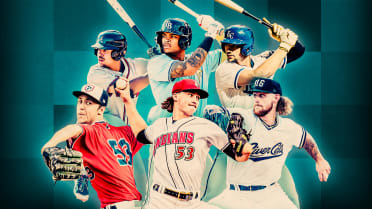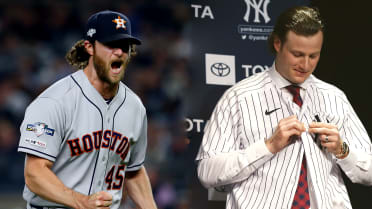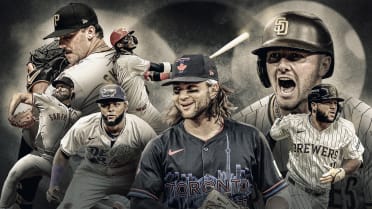Trout's greatness could be beyond explanation
The challenge is to explain the greatness of Michael Trout. Many have tried. Few, it seems, have broken through. There's a general consensus that Trout is the best player in baseball and has been for a while now … and somehow he is STILL underrated.
How is this even possible?
A few years ago, when trying to explain how underrated Darrell Evans was as a player, Bill James came up with 10 characteristics for an underrated player. In my view, five of the 10 apply to Trout.
No. 1: Specialists and players who do two or three things well are overrated; players who do several things well are underrated.
-- Yes. The thing that makes Trout special, almost unique, is how good he is at every single aspect of baseball. Sure, you know Trout hits (.307 lifetime average), hits for power (leads the Majors in homers this years), runs (13 steals this year with zero caught stealing) and plays great defense (he decided to pick up his defense during the offseason and is now playing the best center field of his career).
But he does other stuff, too. He walks a lot -- leading MLB in walks this season for the third time. He's impossibly consistent -- finishing first or second in the MVP voting every full season he has played (and finishing fourth last season after appearing in just 114 games). He's constantly looking to improve, as seen by his defensive improvement this year and his decision to walk more after his rookie year.
No. 2: Driving in runs is overrated; scoring runs is underrated.
-- Trout has led MLB in RBIs, but the three times he finished second in the MVP voting, he did not drive in 100 RBIs, which might or might not have made the difference. Meanwhile, he has led the Majors in runs scored four times, and is leading again this year.
No. 3: Players who play for championship teams are often overrated; players who get stuck with bad teams are often underrated.
-- Here's the big one. There simply has not been a player, probably in any sport, who was as good as Trout has been for the last seven years and has been stuck on such dreary teams. He's been in the playoffs once, and his team was quickly swept out of the playoffs without winning a game.
Most of those on the ubiquitous "greatest player without a championship" lists -- Charles Barkley, Elgin Baylor, Ty Cobb, Dan Fouts, Ken Griffey Jr., Dan Marino and so on -- were at least periodically given a CHANCE at a championship. Not Trout. Yes, you can point to Ernie Banks winning those back-to-back MVP awards for the woebegone Cubs in the late 1950s and early 1960s. Trout has been even better than Banks for even longer.
You never hear the guy complain about that or anything else. But Trout is a living testament to one of those things that's more true about baseball than any other sport, I think: One player can't make a team win, no matter how good he is.
No. 4: Players who are glib and popular with the press are sometimes overrated, while players who are quiet are sometimes underrated.
-- Bill is quick to point out that this factor is sometimes overstated, but I suspect Trout's quiet, nice-guy, workmanlike, just-play-ball demeanor does sometimes make people overlook him. It's the same reason that, historically, many have overlooked the remarkable Stan Musial.
No. 5: Players who play in parks which do not favor their skills are always underrated.
-- This one's easy to miss. Angel Stadium is a pitchers' park. Some years, it's a pretty extreme pitchers' park. Trout for his career hits 11 points better and slugs 17 points higher on the road. That's not a huge difference, but remember that hitters are almost always better at home. You would expect a hitter to get some sort of home-field advantage. Put Trout in Yankee Stadium (where in 20 games he is hitting .368 and slugging .776), and his already amazing numbers would probably jump into the impossible zone.
Those five things might help explain why Trout hasn't broken through as a cultural icon and American idol, but we still have not done a good enough job getting at just how incredible Trout is.
What if we used Wins Above Replacement? That's always a good fallback for explaining Trout because it measures the complete ballplayer. Not even halfway through Trout's age-26 season -- remember, please, that while Trout has been the game's elite player since 2012, he is basically the same age as Aaron Judge -- he has 60.2 WAR.
Is that a lot? Yeah. It's a lot. Trout already has more WAR through age 26 than Yogi Berra, Vladimir Guerrero, Willie Stargell and Tony Perez had in their entire careers. By season's end, assuming he stays healthy, you would expect him to roar by Billy Williams, Dave Winfield, Willie McCovey, Andre Dawson and Craig Biggio.
There's something here worth going into a little bit deeper. There are, I think, maybe 15 players in the last 80 or 90 years who, as they turned 30, had at least a chance to be the greatest player in baseball history.*
*Non-Babe Ruth division. Ruth is too iconic to even be in the conversation.
Most WAR through age 30 since the time of Ruth:
1. Mickey Mantle, 84.8
2. Alex Rodriguez, 80.5
3. Jose Pujols, 73.8
4. Hank Aaron, 73.7
5. Ken Griffey, 70.7
6. Eddie Mathews, 68.3
7. Willie Mays, 68.3
8. Barry Bonds, 66.4
9. Stan Musial, 64.8
10. Frank Robinson, 63.9
11. Ted Williams, 63.4
12. Rickey Henderson, 61.5
13. Trout, 60.2
14. Al Kaline, 59.9
15. Johnny Bench, 59.6
To these, you might add Joe DiMaggio or Cal Ripken or Carl Yastrzemski, though "greatest ever" might have been tough for different reasons. In any case, all of them were in position when they turned 30 to be at the very top. Some faded. Some got hurt. Mays and Aaron kept going -- Musial and Williams were also awesome after 30 -- and as such, they are generally in the conversation for greatest ever.
Trout, as you can see, is on this list … AND HE'S STILL NOT 27 YEARS OLD. Forget passing everyone on this list -- he absolutely will do that if healthy. He actually has an actual chance to have 100 WAR by the time he's 30.
But maybe you don't like WAR. As Heavy J wrote on Twitter: "Avoid WAR and advanced analytics. Give us something we haven't seen and that my 10-year-old would enjoy."
OK, Heavy ... let me tell you about "Black Ink." Though it sounds very dark artsy, it's actually not an advanced analytic the way you might think of one. Black Ink simply refers to the times when a player leads the league in a category (you know how they will show that number in bold letters in the stats ... that's Black Ink).
Bill James came up with Black Ink but it's one of his less involved, more fun inventions. He thought it would be a cool way to predict Hall of Fame chances. He'd give players four points for every time they led the league in something people thought was hugely important, like batting average, homers or RBIs. He'd give three points for something a little bit less regarded like runs scored or hits, two points for stuff like doubles or stolen bases, and one point for the baseline stuff like games played.
Pretty cool, right?
Trout -- and please do not forget, do not ever forget, that he's 26 years old -- scored 38 on the Black Ink measurement. Already. How good is that?
The average Hall of Famer scores 27 on Black Ink.
This is beyond crazy … and this is what you get when through age 25, you've already led your league in RBIs, stolen bases, runs (four times), walks (twice), slugging percentage (twice). He doesn't even get any points for leading the league in on-base percentage twice.
If Trout maintains his lead in all the categories he's leading right now, his Black Ink at year's end will be 48, which will move him ahead of Tris Speaker, George Brett, Rod Carew and, believe it or not, Pujols.
Can I please repeat that he's 26 years old?
Heavy J's 10-year-old son: Are you impressed?
What else can I tell you?
Trout is not really known for his basestealing. And he's STILL stealing bases at an 85 percent clip for his career; this is second all-time among players who have attempted 200 steals.
If Trout wins the MVP this year -- by WAR nobody is even close to him right now -- he will be the youngest player to ever win three MVP Awards. Add in that he probably should have won one or two more.
Trout's OPS+ -- that is to say, his OPS adjusted to league and ballpark -- is tied for fifth all-time. The other five: Ruth, Williams, Bonds, Lou Gehrig, Rogers Hornsby.
And I'm spent. I asked people on Twitter for help to explain how great Trout is. I didn't get exactly the kind of answers I thought I would … but they were pretty good just the same:
Nato Coles: "He's the Beatles, and he's the Rolling Stones."
Matt Schlichting: "It's as if Alexander the Great lived another 30 years, didn't drink, selected an heir before dying and was a five-tool center fielder."
Scott Brady: "If you artificially created a baseball player in a lab with the DNA of Mickey Mantle, Bo Jackson and Barry Bonds, you'd end up with Mike Trout."
Scott: "If Mozart was a baseball player, he'd be Mike Trout."
Even with all that, it still seems like we're underrating Trout … and here's why. Because he's getting better. That's the craziest part of all. He came into this season already in the stratosphere with the all-time greats. And he's hitting better and with more power, he's getting on base more, stealing bases with impunity, playing defense better -- it's awe inspiring. There are no limits.
Joe Posnanski is a national columnist for MLB.com.



